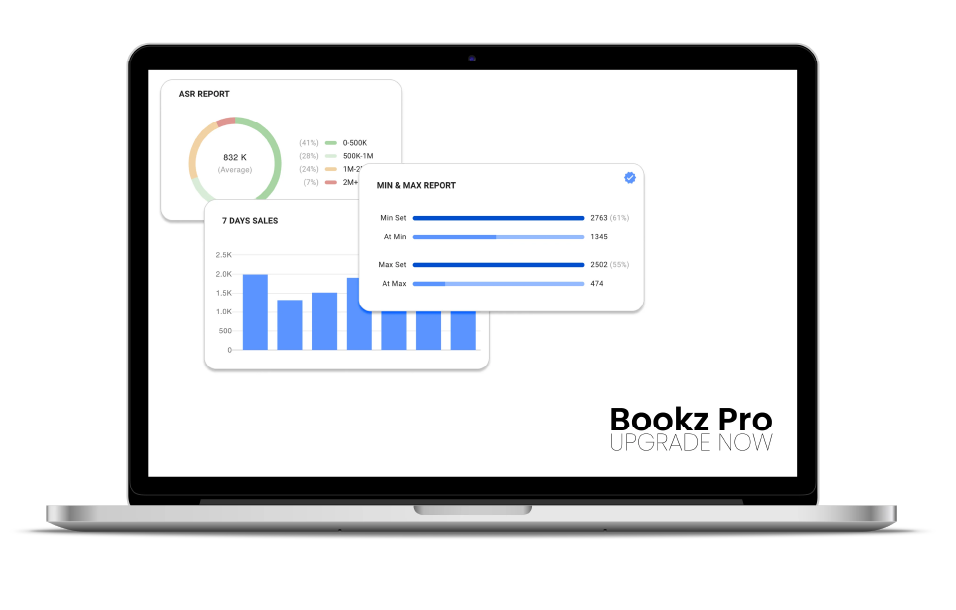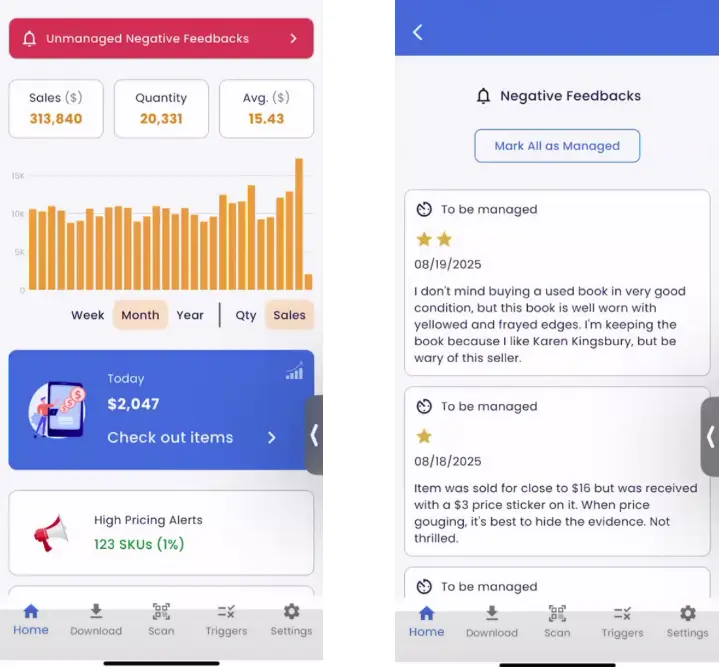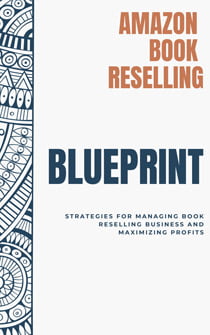Amazon Seller Feedback vs Product Reviews: What Booksellers Must Know

As a book seller on Amazon, you’ve probably already heard about Amazon seller feedback and product reviews. While they might sound similar, they play very different roles in your business. Product reviews focus on the item itself, while seller feedback reflects your performance as a seller.
In this blog, we’ll break down how each one works, why understanding seller feedback is so important for booksellers, and how to manage it effectively to protect your seller account health and boost long-term success.
Product Reviews: What They Really Measure
Product reviews are customer opinions about the product itself. They rate the quality, usefulness, or accuracy of the item.
For private label sellers, product reviews are very important. They affect brand reputation, sales, and search rankings. Reviews can also matter for arbitrage sellers who buy the same product in bulk, like 200 copies. If that item has bad reviews, customers may return it often, which can hurt both inventory and profits.
As for Amazon booksellers, product reviews may not matter that much. Most booksellers sell a single copy of a book which is not their branded product. A bad review of that book doesn’t affect them directly because it criticizes the product itself, not the performance of the seller.
For this reason, success in the book category relies much more on Amazon seller feedback than on product reviews.
Amazon Seller Feedback: Why It Matters for Booksellers
Seller feedback is Amazon’s version of a service scorecard. It reflects how customers view your overall performance as a seller, especially in areas like:
- Shipping speed and item condition — Buyers expect books to arrive on time and in the condition you promised. Listing a book as “Very Good” but sending one with heavy markings or damage is one of the fastest ways to earn negative feedback. Late shipments or missed handling times also weigh heavily against your rating.
- Customer service and problem resolution — Mistakes happen: a wrong edition or format shipped, a book damaged in transit, or a buyer with special concerns. What matters most is how you respond. Quick, professional communication often turns a potential negative into a positive experience.
- Overall buying experience — Seller feedback reflects the entire transaction, from checkout to delivery. Secure packaging, timely updates, and responsiveness all contribute to whether a buyer feels confident purchasing from you again.
Direct Impact on Your Business
Seller feedback is more than just a score on your account. It has a big impact on how well you can sell on Amazon. Each rating changes how buyers see you, and how Amazon evaluates your business. Here’s why it matters:
- Buy box eligibility
The buy box is where the majority of sales take place. Amazon favors sellers with strong feedback because it signals reliability. A higher rating gives you a better chance of winning the buy box over competitors. - Customer trust
Buyers would feel more confident purchasing from sellers with consistent positive feedback. A solid record can reassure them they’ll receive the right book, in the right condition, and on time. - Account health and risk
Amazon monitors your performance closely. Too much negative feedback can pull your account below their standards and might even put your ability to sell at risk. - Long-term sustainability
Selling books is all about sustainability and long-term value. Good feedback helps you get repeat buyers, win the buy box more often, and keep your account strong — all of which are key to lasting success.
Think of it like the restaurant ratings on Google Maps. If you saw a restaurant with a 3.1-star average, would you eat there? Probably not.
The same logic applies on Amazon. Customers hesitate to buy from sellers with weak ratings, and Amazon heavily weighs those ratings.
That’s why smart booksellers sometimes accept short-term losses, like offering a refund or discount, if it helps remove negative or neutral feedback (always be compliant with Amazon TOS). Protecting your long-term account health is far more valuable than holding onto one sale.
All in One Software
for Book Sellers
Scout Better – List Faster – Reprice Smarter
Over 30% Business Growth
Achieved by Our Clients

Feedback Removal: What You Can and Can’t Do
Amazon allows sellers to request the removal of certain feedback, especially ratings of three stars and below. Even neutral ratings can drag down your overall score. That said, the likelihood of removal isn’t the same for every fulfillment type:
- FBA orders: Amazon takes responsibility for most fulfillment issues, so many negative feedback can often be removed. You can make use of this as an advantage.
- FBM orders: The chances of removal are less likely compared to FBA orders. Since you handle fulfillment yourself, negative feedback is much harder or usually not removed.
While removal outcomes differ between FBA and FBM, it’s important to manage feedback the right way. Stay compliant with Amazon’s policies — offering refunds or acknowledging mistakes is fine, but never step outside the rules.
Common Reasons for Negative Seller Feedback
Booksellers often run into the same feedback complaints:
- Item condition doesn’t match description.
- Wrong book sent.
- Late delivery.
- Defective copy.
- Order canceled.
The most effective way to maintain a healthy feedback percentage is by preventing these issues before they happen. But when problems do arise, addressing them quickly and professionally is the best way to protect your reputation and your account health.
The Importance of Urgency
Time is everything when managing Amazon seller feedback. While you can request removal for up to thirty days after feedback is posted, you have only five days to respond once Amazon replies to your case. If you don’t act within that window, the case closes and you can no longer appeal to their decision. The faster you respond, the better your chances of getting the feedback resolved or removed.
Some effective steps include:
- Responding to customer messages within 24 hours.
- Issuing refunds promptly when they’re justified.
- Taking responsibility for mistakes rather than ignoring them.
Bookzy Mobile: Managing Feedback in Real Time
It is important to stay on top of your seller feedback, but many booksellers don’t have the time to log in to Seller Central regularly, especially when they’re out sourcing for books. That’s why Bookzy Mobile introduces the “unmanaged negative feedback” feature.
With this feature, you’ll be alerted the moment new negative feedback comes in, directly within the app. This means you can respond immediately, instead of waiting until you’re back at a computer.
Many resellers have already found this feature very helpful, as it gives them peace of mind and control over their feedback, even on the go. Unlike other scouting apps such as ScoutIQ and Scoutly, Bookzy Mobile is a database-driven mobile app that’s more affordable while still offering all the major functionality sellers need. On top of that, it includes unique features those apps don’t provide, making it a smarter choice for Amazon booksellers who want both value and specialized tools.

Bookzy Mobile is available on both iOS and Android — download it today and start managing your Amazon seller feedback with confidence, wherever you are.
Your FBM Journey Doesn’t Have to Be Overwhelming

Amazon Book Reselling Blueprint
Read now, explore our full guide. Your revolution starts here. Subscribe to get the blueprint!
Getting started with Amazon FBM can feel overwhelming—managing inventory, shipping deadlines, and customer service often holds sellers back from reaching their full potential.
That’s why we created the Amazon Book Reselling Blueprint—a step-by-step guide to help you source smarter, optimize your listings, and scale with confidence. Pair it with Bookz Pro’s automation tools, and you’ll spend less time worrying about fulfillment and more time growing your business.
Start your free 14-day Bookz Pro trial today—no obligation. Combine it with the Amazon Book Reselling Blueprint to hit the ground running.
Conclusion
For booksellers, Amazon seller feedback matters far more than product reviews. While product reviews affect branded products, seller feedback has a direct impact on your buy box eligibility, account health, and overall business sustainability.
The smartest approach is to prevent problems wherever possible, while also responding quickly when issues do arise. Request feedback removals when appropriate, and take advantage of tools like Bookzy Mobile to get notified of your ratings in real time.
By keeping your feedback rating strong, you protect your reputation, build trust with buyers, and create a foundation for long-term, sustainable growth.
How do you handle negative feedback? Do you deal with it right away, or wait until it starts to pile up?
Frequently Asked Questions
Amazon seller feedback measures customer satisfaction with the seller’s performance. It means shipping, accuracy, and customer satisfaction, not the product itself.
Product reviews critique the book, not the seller. Seller feedback directly affects a bookseller’s buy box chances and account health.
Yes, but be very careful to stay compliant with Amazon’s Terms of Service. FBA orders are easier to remove since Amazon handles fulfillment.
Because a negative feedback case will be closed within five days if you don’t reply to Amazon’s response. Acting quickly gives you the best chance of removal or resolution.
Yes. A low rating reduces your chances of winning the buy box.
Sometimes, yes. Protecting long-term account health often outweighs short-term profits.
Yes. Even though it’s not negative, neutral ratings still lower your average score. That’s why it’s worth requesting removal of three-star feedback or below whenever possible.
It’s best to check daily. If that’s not possible, use tools like Bookzy Mobile to get instant alerts so you never miss new seller feedback. Prompt action helps protect your account health.



